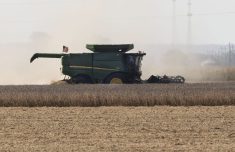CWB officials confirmed July 31 that the marketing agency has reached a commercial grain handling agreement with Louis Dreyfus Canada.
Louis Dreyfus has 10 modern, high-throughput facilities on the Prairies including two in Manitoba, five in Saskatchewan, two in Alberta and one in British Columbia.
Based on total storage capacity, Dreyfus ranks as the sixth largest grain handler in Canada, with total capacity of nearly 350,000 tonnes.
With the new agreement in place, farmers who market their crops through the CWB can now deliver grain to more than 130 delivery points across western Canada.
Read Also

Russia’s seaborne grain exports fell 10 per cent year-on-year in September, data shows
Russia’s seaborne grain exports fell to 5.1 million metric tons in September, 10.1 per cent down on the same month of 2024, according to shipping data.
The CWB also has commercial grain handling arrangements with Cargill, Viterra and a handful of smaller independent grain handling companies across the West.
“The CWB remains well on track to serve farmers into the future as their expert grain marketing partner,” said White.
“Our network of partner delivery points will continue to grow, ensuring that farmers can sign CWB contracts with confidence.”
White said discussions are continuing with the other major handlers, adding that CWB expects to announce additional agreements in the near future.
It has yet to reach agreements with Richardson Pioneer, Paterson Grain and Parrish & Heimbecker.
Together, those three companies own more than 100 primary elevators in Western Canada and control close to 1.75 million tonnes of total storage capacity.
As of Aug. 1, the CWB ceased to be the sole marketer of wheat, durum and malting barley produced in Western Canada.
In the future, it will operate as a voluntary marketing agency, competing with the private grain trade for the opportunity to sell farmers’ grain and oilseed crops.
The CWB does not own its own grain handing facilities. Instead, it is negotiating grain handling agreements with private sector companies in order to get farmers’ grain to market.
White said last week that the agency has not ruled out the possibility of acquiring grain handling assets in the future.

















